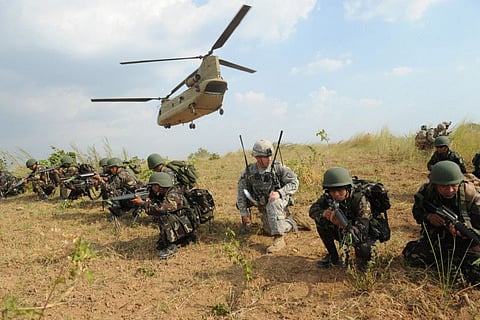Philippines' Duterte deals blow to US by terminating troop pact
‘Serious step with significant implications,’ says US

Manila: Philippine President Rodrigo Duterte on Tuesday terminated a two-decade-old Visiting Forces Agreement with the United States (VFA) delivering on threats to downgrade an alliance crucial to US interests.
The mercurial Duterte, who has clashed with the former colonial ruler over several issues, has decided to pull the plug on the two-decade troop rotation pact to enable the Philippines to be more independent with its relations with other countries, spokesman Salvador Panelo said.
“The president will not entertain any initiative coming from the US government to salvage the VFA, neither will he accept any official invitation to visit the United States,” Panelo said in a statement.
The decision, sparked by the revocation of a US visa held by the former police chief who led Duterte’s bloody war on drugs, could complicate US military interests in the Asia-Pacific as China’s ambitions rise.
It would also limit Philippine access to US training and expertise in tackling Islamist extremism, natural disasters and maritime security threats.
Panelo said Duterte’s decision was a consequence of US legislative and executive actions that “bordered on assaulting our sovereignty and disrespecting our judicial system”.
The US embassy in Manila called it “a serious step with significant implications”.
“We will carefully consider how best to move forward to advance our shared interests,” it said in a statement.
The defence pact sets out rules for US soldiers to operate in the Philippines and is one of three governing what Washington has called an “ironclad” relationship, despite Duterte’s tirades about US hypocrisy, ill-treatment and ageing weapons.
Duterte says the United States uses the pacts to conduct clandestine activities like spying and nuclear weapons stockpiling, which he says risk making the Philippines a target for Chinese aggression.
‘WE MUST HAVE A SAY’
Some senators sought to block Duterte’s move soon after news of it broke, arguing that without Senate approval he had no right to unilaterally scrap international pacts it had ratified.
“We must have a say on this important matter,” Senator Richard Gordon told the house.
Some lawmakers are concerned that without the VFA, two other pacts would be irrelevant, namely the 2014 Enhanced Defence Cooperation Agreement made under the Obama administration, and a 1951 Mutual Defence Treaty.
Those cover dozens of annual training exercises and broaden access of US air, navy and army forces and equipment to the Philippines, as well as bind the two countries to defend each other from external aggression.
Supporters of the agreements argue they have deterred Chinese militarisation in the South China Sea and $1.3 billion (Dh4.77 billion) of US defence assistance since 1998 has been vital in boosting the capabilities of under-resourced Philippine forces.
Philippine nationalists, however, say the United States did nothing to stop China building islands in the South China Sea equipped with missiles, and say the VFA is lopsidedly favourable to Americans, including the granting of immunity from prosecution for US servicemen.
Duterte, who favours closer ties with China and Russia, pressed ahead with the termination despite a Senate hearing on the VFA last week during which his senior generals and defence and foreign ministers spoke in favour of it.
Ending the VFA could be a blow to Washington’s interests in maintaining a troop presence in the Asia-Pacific, amid friction over the presence of US personnel in Japan and South Korea and regional security concerns about China and North Korea.
Sign up for the Daily Briefing
Get the latest news and updates straight to your inbox



